- Home
- Lauren Willig
The Mischief of the Mistletoe Page 20
The Mischief of the Mistletoe Read online
Page 20
Lord Henry shrugged, as though he considered it something of an irrelevancy. “Beg pardon, Miss Dempsey. Mind the ice.”
Mind the ice? She had been minding the ice until he pushed her into it.
He followed his friends into the house, leaving Arabella and Turnip at the foot of the stairs.
Arabella looked at Turnip.
Turnip looked at her.
They stood there at the base of the steps and stared at each other like a pair of mutes.
This was absurd.
“Thank you,” Arabella said. Her voice sounded very thin and reedy in the shadow of the great house. Desperately trying to think of something else to say, she blurted, “How is Sally?”
“Well. Sally is well.” Turnip cleared his throat. “And your journey?”
“Wonderfully free of cows,” said Arabella, and had the satisfaction of surprising him into a smile.
Turnip’s face broke into a broad, genuine grin. “Shouldn’t fear for my phaeton, then. Should I?” he added, and Arabella had a feeling he wasn’t talking about his phaeton. Or cows.
He regarded her warily from under his hat brim, which was, Arabella noticed, slightly crooked. Her fingers itched to straighten it.
She tucked her hands safely away by her sides.
“No.” Arabella looked appealingly at him, wishing she had a clue what to say next. I’m sorry, might be a start. So easy in her head, so hard to push past her lips. She dropped her head. “I like your boots. They’re very . . . shiny.”
“Thank you.” Turnip looked down at his own toes. “It’s m’valet, you know. He shines them.”
“Right,” said Arabella. Maybe she ought to try speaking in French or Latin. She wasn’t doing very well in English. She took a deep breath. “Tur—Mr. Fitzhugh?”
He leaned forward, his hat slipping over his brow. “Miss Dempsey?”
“There you are!”
Turnip stepped back, hit the patch of ice, and went skidding as Penelope Deveraux appeared at the top of the stairs. He landed heavily on his backside with a loud, grunting noise.
Miss Deveraux was unimpressed. “If you’re quite through falling down, Mr. Fitzhugh, I was just telling Lord Frederick that you had already offered to help me hang my bough.” On Miss Deveraux’s lips, the innocent phrase turned into something indescribably suggestive. She strolled over to Turnip, twirling an evergreen bough in one hand. With the tip of the bough, she flipped the edge of his hat. “Haven’t you, Mr. Fitzhugh?”
The sharp scent of pine made Arabella’s nose itch.
Turnip stumbled awkwardly to his feet. “Yes. Guess I must have.”
Twining her arm through Turnip’s, Miss Deveraux cast a challenging look over her shoulder. “As you see, Lord Frederick, you’ll just have to wait your turn.”
Standing in the doorway, Lord Frederick stepped aside to make room for them to pass into the warmth of the hall. “I don’t approve of waiting.”
Miss Deveraux paused in the doorway beside him, tilting her head up to look Lord Frederick in the eye. “Patience is a virtue, Lord Frederick.”
Lord Frederick lowered his mouth to Miss Deveraux’s ear. “Vices are far more entertaining.”
Miss Deveraux grinned. “Aren’t you optimistic.” She shoved lightly at his waistcoat. “Do stop loitering in the doorway, Lord Frederick. You’re keeping the others in the cold. Come along, Mr. Fitzhugh. No dawdling.”
She tugged Turnip along behind her like a child’s toy on a string.
Turnip looked back over his shoulder at Arabella. Arabella quickly looked away. She didn’t need his charity. And he would obviously not repine for the lack of her scintillating conversation about the shine on his boots.
Maybe she should go upstairs. There were several rather scathing things she wouldn’t mind writing to Jane.
“Arabella!” Arabella found herself wrapped in lace and scent as Aunt Osborne flung her arms about her neck. “Did you arrive before us? Such a journey we’ve had—oh, child, what have you done to your hair? I must speak to Rose.”
She had forgotten how tiny her aunt was. The top of Aunt Osborne’s green silk turban barely reached Arabella’s chin.
Sneezing as the elaborately curled feather tickled her nose, Arabella dutifully embraced her aunt, inhaling the old familiar scents of face powder and rosewater. “Happy Christmas, Aunt Osborne.”
Her aunt beamed at her, the makeup she had always applied with a lavish hand looking less foolish on her than it ought. Up close, Arabella could see the powder caked in the wrinkles of her aunt’s cheeks, but from a distance, the effect was deceptively youthful.
“Silly girl, it’s not Christmas until tomorrow, although I trust it will be a happy one. Goodness, how red your cheeks are. Have you been outside in that wind? It’s terrible for the complexion.”
“Yes, Aunt Osborne.” It was easier to agree than not.
“We’ll do something about it tomorrow.” By tomorrow, her aunt would have forgotten all about it.
“Hayworth?” Aunt Osborne twisted her head to look at her husband. “Aren’t you going to say hello to Arabella?”
“Certainly,” said Hayworth Musgrave smoothly.
She hadn’t even realized he was there. How odd to think that not so long ago, she had been preternaturally aware of his presence, attuned to his every least coming and going, as attentive to his moods as she had been to her own. Now his presence came almost as an afterthought.
He stood a little way back, watching the interplay between her and her aunt with a slight, superior smile. He was waiting, Arabella realized, for her to come to him. Two months ago, she would have.
With the detachment of two months’ distance, Arabella regarded him critically. Captain Musgrave’s wasn’t the sort of countenance to set debutantes swooning. His face was oddly shaped, with a heavy jaw that made his head seem larger on the bottom than on the top. His mouth was wide, his smile lopsided, his nose crooked. His sandy hair stuck out at all angles, giving him a scarecrow air. He was tall enough, taller than she at any event, with the muscles that came of regular exercise, but after only two months’ marriage, the signs of dissolution and discontent were already beginning to show in his countenance, in the softening of the flesh beneath his chin and the lines at either side of his lips. He would be stout by the time he was thirty, jowly by forty. The uniform he had worn before he sold out suited him better than the civilian clothes Aunt Osborne’s generosity had bought him. The puce jacket with its gold embroidery was too bright; it made his face sallow by contrast.
Even at the height of her infatuation, Arabella had never deluded herself into thinking him handsome. Charming, yes; handsome, no.
She had told herself that this was a sign of the true depth of her affections, that she was able to value not the inconsequential physical husk, but the real worth of the man beneath.
What a ninny she had been.
When Arabella made no move to come to him, he took a step forward, reaching out to take both her hands in his. “Hello, Arabella.”
His grip was light, more for show than substance. Arabella gently abstracted her hands. “Hello, Uncle Hayworth.”
He winced theatrically. “You make me sound like Methuselah. I’ll be counting gray hairs next.”
“Call them silver and I’m sure you’ll like them much better,” Arabella shot back.
Captain Musgrave gave her a quick, startled glance, as though a Watteau shepherdess had just come after him with her crook.
“I trust you had a good journey?” Arabella said hastily.
There was no point in picking quarrels with her aunt. Or her aunt’s husband. It didn’t matter anymore.
Captain Musgrave looked at her uneasily for a moment, and then decided he must have misunderstood.
And why shouldn’t he? She had always been on good behavior with him before, so anxious to please that she had never said anything of interest at all.
Her new uncle shrugged, setting the gold threads in his jacket glit
tering. “The inns were nothing to brag about, but we managed passably well.”
“Passably?” Aunt Osborne flung her arm through his, entangling him in a web of silk fringe. “I should say we got along famously.”
A look of thinly veiled dislike crossed his face before he masked it with a smile as fatuous as hers. “Yes, yes, my love.” There was something decidedly perfunctory in the way he patted the jeweled hand resting on his arm. “Your company could make the most dreary road bright.”
“More economical than candles,” said Arabella brightly.
“Pardon?”
Arabella looked at Captain Musgrave’s uncomprehending face and wondered, as if from a world away, how she could have thought she loved him. Admittedly, it hadn’t been the cleverest comment, but that didn’t matter.
“Nothing,” she said. “It was nothing.”
It was true, she realized, in more ways than one.
She looked across the hall and saw Turnip standing by the Dowager Duchess of Dovedale’s litter—an ornate, gilded thing carried by four uniformed footmen. From where she was standing, Arabella couldn’t see the dowager herself, but she could see her cane, wagging imperiously as Turnip obediently followed her direction in moving a bough of holly first this way, then that.
The dowager raised her cane in a peremptory summons and Penelope Deveraux strolled over, pausing on her way to poke Turnip in the ribs with the easy familiarity of old acquaintance.
Arabella thought uncharitable thoughts.
“Arabella?” Captain Musgrave’s voice was impatient. She was meant to be paying attention to him, not woolgathering.
“Forgive me.” Arabella shook her head to clear it. “The fatigues of the day . . .”
Captain Musgrave arranged his features into an expression of understanding. She could see the pity in his eyes, a very smug and satisfied sort of pity. “Of course. You need your rest.” He squeezed Aunt Osborne’s arm. “Not everyone can be as young as Celia.”
Aunt Osborne fluttered. “Oh, Hayworth!”
The dowager snapped her fingers at a footman, who stepped forward with a basketful of mistletoe. Penelope Deveraux reached inside, withdrawing a good-sized sprig. Turnip held out his hand for it. Miss Deveraux drew it challengingly back.
Arabella didn’t want to watch.
“Good night, Aunt.” She flashed a quick, tortured smile at her aunt, who looked at her in some surprise, as though she had already forgotten she was there.
Captain Musgrave cleared his throat.
“Good night . . . Uncle,” said Arabella, and fled in the direction of her room and her writing desk.
“YOU’LL PROBABLY HANG IT UPSIDE DOWN,” said Penelope, yanking away the mistletoe.
“At least I can reach the doorframe,” said Turnip, holding out his hand for it.
“So can a stepladder,” said Penelope scathingly, but she surrendered the sprig.
“The stepladder would make better conversation,” opined the dowager from her lofty post atop her litter.
“Stepladders can’t talk,” Turnip pointed out.
The dowager smirked. “My point precisely.”
Penelope rolled her eyes. “Just put up the mistletoe. I have plans for it.”
“What sort of plans?” asked Turnip warily.
He hoped they didn’t involve him. Every now and again, Penelope got bored and dragged him out onto a balcony. Or under the mistletoe. Smashing girl and all that, Penelope, but she wasn’t the one he wanted under the mistletoe.
Turnip looked around, but he didn’t see Arabella. The people she had been talking to were still there, but she was gone.
“Those sorts of plans.” Penelope sent a sultry glance in the direction of Lord Frederick Staines, who was too busy pounding back claret to notice.
“Drink, drink, drink!” chanted Lord Henry and Lieutenant Danforth, banging their fists against their knees in perfectly syncopated rhythm.
Lord Frederick gave an explosive gasp and set the cup down with a clang, claret dripping bright red drops on the stiffly starched linen of his cravat.
Turnip made a face at Penelope. “Might want to watch yourself there, old thing.”
Clasping her hands to her bosom, Penelope pivoted to face the dowager. “He cares! How sweet.”
Turnip peered past her, at the misrule reigning in the hall. Freddy Staines was passing the cup to Martin Frobisher; Lady Charlotte was diligently tying red velvet bows around sprigs of greenery; and someone had decided to practice sword dancing with axes instead of swords.
There was still no sign of Arabella. Instead, Turnip caught sight of Pinchingdale, who was making his shadowy way towards the stairs.
He had a few questions he wanted to ask Pinchingdale.
“Here.” Turnip shoved the mistletoe at Penelope. “You win. You take it.”
“No gumption,” decreed the dowager and sped him on his way with a well-placed jab of her cane.
Turnip careened into Pinchingdale. “Just the chap I wanted to see,” he said, seizing him by the arm and dragging him off into the next room. It was an anteroom, of the sort used for keeping unimportant people waiting until they were duly intimidated by the ducal decorating scheme. “How important is this list of yours?”
Pinchingdale rubbed his shoulder where Turnip had grabbed him and checked to make sure the door was closed. The walls of Girdings were thick enough to withstand a siege; they wouldn’t be overheard. “Very.”
“Important enough for someone to tear up someone’s room to get it?”
“I’d say that’s the least of what people would be willing to do to get their hands on it. Why? What do you know?”
“I think,” said Turnip, choosing his words very carefully, “that Miss Dempsey might have had it. Or that someone might think she had it.”
“Miss Dempsey?”
“We’ve been through this before,” said Turnip irritably. “You know who she is.”
“I know I know who she is,” said Pinchingdale, and shook his head a little, as though to clear it. “What I want to know is what she would be doing with a highly sensitive government document.”
“She teaches at Miss Climpson’s. There was—well, long story, but the short of it is that people were blundering about in the middle of the night and Miss Dempsey ended up with a notebook that wasn’t hers. Someone tore her room up the next day. The notebook disappeared.”
Pinchingdale shook his head. “The document I’m talking about is a single sheet of paper, not a whole notebook. The two incidents are probably unrelated.”
“But what if they’re not?”
“If they’re not?” Pinchingdale looked grim. “Then your Miss Dempsey is in a great deal of danger.”
Chapter 21
I say,” said Turnip in wounded tones. “There’s no need to go all melodramatic.”
“Well, you did seem to be fishing for it,” said Pinchingdale apologetically. “I didn’t want to disappoint you.”
“I was being serious!” said Turnip indignantly.
“And so was I,” said Pinchingdale, sobering. “Up to a point. If your Miss Dempsey really did have that document, she would be in grave danger. I, for one, find it highly unlikely. A student notebook is an unlikely means of conveyance.”
“The notebook was in French.”
“The document wasn’t.”
“What exactly is this list? How long is it?”
“Long enough,” said Pinchingdale gravely. “Long enough to cause a great deal of bother. We have a string of Royalist agents posted between Boulogne and Paris. Most are French. They serve as couriers for both information and people. Without them, a vital link to the coast would be cut.”
“That ain’t all, is it?” said Turnip shrewdly.
“Isn’t that enough?” Pinchingdale tapped his fingers against the green marble mantelpiece. “Bonaparte would give his eyeteeth to get his hands on that list. Having to rebuild that network would set us back months, perhaps years.”
“What are eyeteeth?” asked Turnip.
Pinchingdale mustered a tired grin. “I don’t know, but they appear to be uniquely expendable. Some people feel the same way about human life.”
“You don’t need to tell me,” said Turnip. “I’ve met some of them.”
He was fairly sure they were both thinking of the same person: the Marquise de Montval, agent of the dread spy, the Black Tulip. She was, by all accounts, dead. Turnip wouldn’t have believed it if Pinchingdale hadn’t witnessed it himself.
The marquise had had a marked fondness for stilettos. She had worn them in her hair, decorated with diamonds, disguised as ornaments. She hadn’t been all that particular as to where they landed. Turnip didn’t like to think what she might have done to Arabella. The marquise’s motto had been stiletto first, questions later.
Where there was one demented French spy, there would be others. They were a bit like bees, thought Turnip philosophically. Swat one and the whole hive came swarming down on your head.
“Why are you here?” Turnip asked. “Why are you really here?”
Pinchingdale tried the eyebrow trick. “To celebrate Christmas?”
“Ha,” said Turnip intelligently. Pinchingdale couldn’t fool him, not even with that eyebrow. A chap didn’t go off to a Christmas party without his wife. “Where’s Lady Pinchingdale, then?”
“Letty,” said Pinchingdale, “is upstairs sleeping. The trip tired her.”
“Oh.” It sounded reasonable enough on the surface, but it didn’t quite wash. From what Turnip had seen of the new Lady Pinchingdale, she was fairly indefatigable. Unless . . .
“I say!” he blurted out. “Is she . . . ?”
Pinchingdale looked up at the ceiling overhead, which was decorated with several overblown nymphs. “You really do say whatever comes into your mind, don’t you?”
“Sink me if that ain’t good news!” Turnip pounded his old school chum on the back so hard that Pinchingdale doubled over, coughing. “Splendid, I say! Make a deuced smashing father. Hope you have ten. Not all at once, of course.”
“Thank you,” said Pinchingdale, when he got his breath back. “I’ll tell Letty you said so.”

 That Summer
That Summer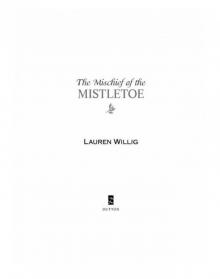 The Mischief of the Mistletoe
The Mischief of the Mistletoe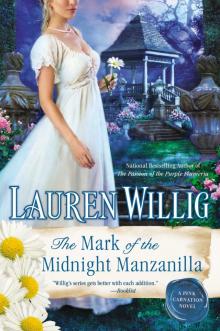 The Mark of the Midnight Manzanilla
The Mark of the Midnight Manzanilla The Other Daughter
The Other Daughter The Ashford Affair
The Ashford Affair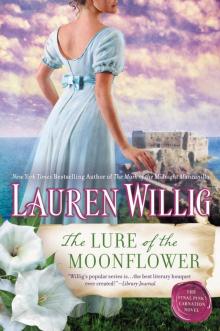 The Lure of the Moonflower
The Lure of the Moonflower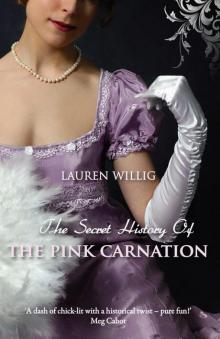 The Secret History of the Pink Carnation
The Secret History of the Pink Carnation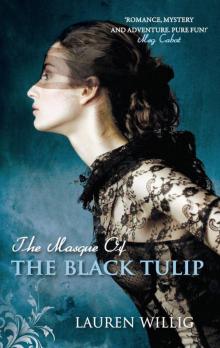 The Masque of the Black Tulip
The Masque of the Black Tulip The Passion of the Purple Plumeria
The Passion of the Purple Plumeria The English Wife
The English Wife The Garden Intrigue
The Garden Intrigue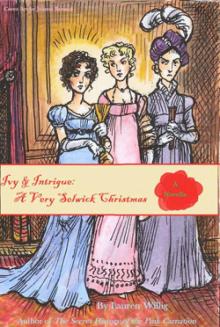 Ivy and Intrigue: A Very Selwick Christmas
Ivy and Intrigue: A Very Selwick Christmas The Orchid Affair
The Orchid Affair The Summer Country
The Summer Country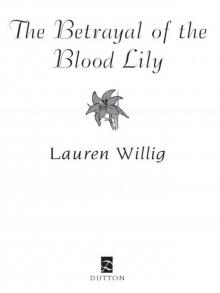 The Betrayal of the Blood Lily
The Betrayal of the Blood Lily The English Wife: A Novel
The English Wife: A Novel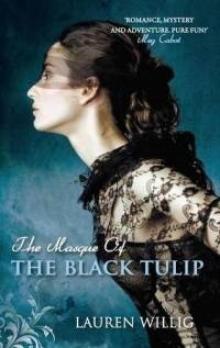 Masque of the Black Tulip pc-2
Masque of the Black Tulip pc-2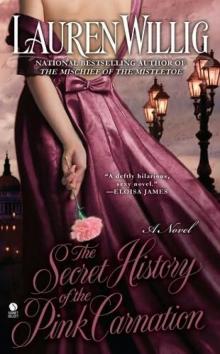 The Secret History of the Pink Carnation pc-1
The Secret History of the Pink Carnation pc-1 That Summer: A Novel
That Summer: A Novel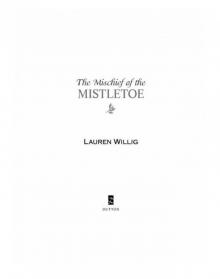 The Mischief of the Mistletoe: A Pink Carnation Christmas
The Mischief of the Mistletoe: A Pink Carnation Christmas